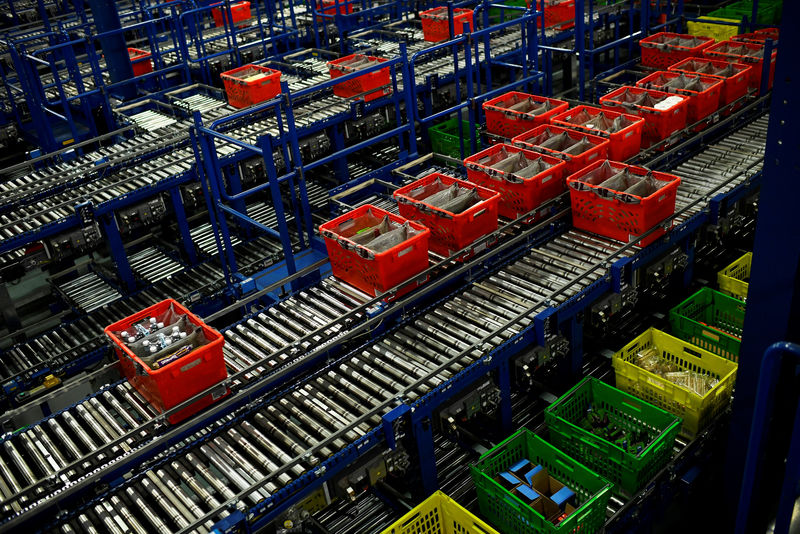Proactive Investors - Ocado Group PLC (LON:OCDO) is in the midst of an identity crisis.
Ocado, via its ocado.com joint venture with Marks & Spencer Group plc, operates its own online grocery store in the UK. This we all know; Ocado vans are a mainstay of Britain’s congested traffic lanes.
But at its heart, Ocado is – or is at least trying to position itself as – a technology company.
Not everyone has got the memo though, particularly Britain’s investment class, which has refused to price Ocado’s shares in alignment with other tech stocks.
This has led rumours swelling that Ocado is poised to handle its identity crisis in the same fashion as many other British technology companies before it- by moving its primary listing stateside.
Some have completely dismissed these rumours, including Shore Capital Markets’ Clive Black, who in April called it a “stunt from wherever to boost the heavily loss-making British ‘tech’ company’s share price”.
But is there a legitimate point behind the rumours and if so, what would be the justification for Ocado seeking a more welcoming investment class outside of the Square (NYSE:SQ) Mile?
By the numbers
Technology is without a doubt Ocado’s fastest-growing sales line.
In full-year results published in February, technology sales grew 44% year on year while retail grew just 7%.
Tech is still a significantly smaller segment though, bringing in £429 million worth of sales in 2023 compared to retail’s £2.4 billion-plus.
Any potential divorce between the two would make Ocado a substantially smaller operation.
It would also make Ocado “higher quality, with higher margins, more recurring revenue and much lower capex”, said one investment analyst speaking with Proactive on the matter.
As of 17 May, Ocado’s share price is effectively a 1:1 ratio of all combined operations on a price-to-sales basis.
If using Ocado’s forward guidance of mid-to-high single-digit revenue growth, the PS ratio dips below 1:1. Not unheard of in the low-margin retail space, but criminally cheap in the tech space.
Undervalued, underappreciated
Simply put, Ocaco is objectively undervalued as a tech company.
But according to the analyst, this is “not necessarily a lack of understanding” among the investment community. “It might be more about a lack of belief in the business model, especially compared to North American investors who are more open to futuristic bets.”
Ocado also has a history of disappointing financial results, breeding further scepticism among Square Mile investors.
Garyth Stone, managing director of investment bank Houlihan Lokey Inc (NYSE:HLI)’s consumer, food and retail group, said: “The UK market focuses more on cash flow, profitability, and dividend stability… If (Ocado moved its listing) to the NASDAQ, it might get a fresher perspective from US investors.”
True, British tech companies do command superior valuations stateside (hello Arm Holdings PLC (NASDAQ:ARM)), but there is a key difference between Ocado and Arm, or indeed other British companies that have made the move, such as Darktrace (LON:DARK) and non-tech companies like Flutter (LON:FLTRF).
These companies that have moved stateside have done so partially because that is where most of their sales come from.
Ocado, on the other hand, is still a UK-centric business.
Stone agreed that US investors prefer companies with significant US sales, “but listing on the NASDAQ, which is more internationally focused than the New York Stock Exchange, could still be beneficial. It's not a magic bullet, but it could be a sensible move”.
Spinning out
Listing change or no listing change, some analysts see a spinning out of Ocado’s retail operations as a very logical next step that is likely being considered by management.
AJ Bell analyst Russ Mould echoed this sentiment: "In doing so, Ocado would no longer be associated with the little vans that deliver loaves of bread to Mrs Miggins. That act in itself would be an important first step in trying to get the market to look at the business in a different way."
This may have already been foreshadowed with the recent addition of Gavin Patterson to the board.
As former chief executive of BT (LON:BT) and former president and chief finance officer of Salesforce, Patterson ticks all of the boxes- B2B, tech and US capital markets. It’s almost too convenient.
Commenting on his addition to the board, Patterson called Ocado “a true technology pioneer… It has developed and proven applications of AI and robotics that solve some of the most complex supply chain challenges in grocery and logistics. I look forward to working with the board and the leadership team at this exciting time”.
Whether this ‘exciting time’ is an allusion to a stateside move will be determined in due course.
One thing is for certain- the recent controversy over Ocado’s chief executive Tim Steiner’s salary won’t have sweetened London’s appeal.
Dissenting shareholders (comprising nearly a fifth of total votes) were vexed at Steiner’s potential £15 million remuneration package, given shares are off 88% since the pandemic-era Halcyon days.
Shareholder advisory firms, meanwhile, criticised Ocado’s refusal to pay a real living wage.
All valid points that nonetheless feed into the thesis for listing in a place where middling issues like 1,800% bonus multipliers and fair hourly wages aren’t as contentious.
Putting the ‘how’ aside, there is little doubt that Ocado needs to make big changes to turn the ship around and recover lost value. Don’t be massively surprised if the Square Mile loses another member in the process.
